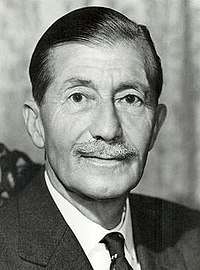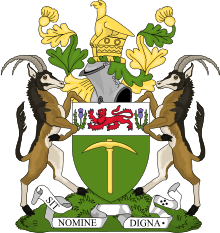Clifford Dupont
| His Excellency The Right Honourable Clifford Dupont GCLM, ID | |
|---|---|
 Clifford Dupont, President of Rhodesia | |
| 1st President of Rhodesia | |
|
In office 2 March 1970 – 31 December 1975 | |
| Prime Minister | Ian Smith |
| Preceded by | Himself as Officer Administering the Government |
| Succeeded by | John Wrathall |
| 1st Officer Administrating the Government | |
|
In office 17 November 1965 – 2 March 1970 | |
| Prime Minister | Ian Smith |
| Preceded by | Sir Humphrey Gibbs (as Governor of Southern Rhodesia, de facto) |
| Succeeded by | Himself as President |
| 1st Deputy Prime Minister of Southern Rhodesia | |
|
In office 1964–1965 | |
| Prime Minister | Ian Smith |
| Preceded by | none |
| Succeeded by | none |
| Personal details | |
| Born |
6 December 1905 London, England |
| Died |
28 June 1978 (aged 72) Salisbury, Rhodesia |
| Political party | Rhodesian Front |
| Spouse(s) |
Barbie Dunport (1933–42) Betty Wood (1946–57) Armenell Mary Betty Bennet (1963–78) |
| Children |
Hilary Graham Stephen |
| Alma mater | Clare College, Cambridge |
| Profession | Solicitor |
Clifford Walter Dupont, GCLM, ID (6 December 1905 – 28 June 1978) was a Rhodesian politician who served in the internationally unrecognised positions of Officer Administrating the Government (from 1965 until 1970) and President (from 1970 to 1975). Born in London and qualifying as a solicitor, Dupont served during the Second World War as an officer of the British Royal Artillery in North Africa before first visiting Southern Rhodesia in 1947. He returned a year later, started a ranch and emigrated full-time during the early 1950s, by which time the country had become a territory of the Federation of Rhodesia and Nyasaland.
When Rhodesia's government issued the Unilateral Declaration of Independence from Britain on 11 November 1965, Dupont, as Deputy Prime Minister, was the second to sign. Smith attempted to have Dupont named as Governor-General in place of the British-appointed Governor, Humphrey Gibbs, but failing this instead made him Officer Administering the Government.[1] He held this post until 1970, when he became President following the declaration of a republic. After suffering from ill health during this last appointment, he retired at the end of 1975 and died in 1978.
Early life
Of Huguenot ancestry,[2] Dupont was born in London on 6 December 1905, to Alfred Walter and Winifred Mary Dupont[3] into a family which consisted of two older brothers and an elder, and subsequently a younger, sister.[4] His father founded a commercial firm dealing largely in the "rag trade".[5] Dupont himself was educated at Bishop's Stortford College and Clare College, Cambridge where he read law.[3] He qualified as a solicitor in 1929 and set up his own firm in 1933.
Having served in the Royal Artillery[3] Officer Training Corps while at University, on the outbreak of World War II he was commissioned into the Artillery and served as an adjutant for a light anti-aircraft battalion. He served in North Africa and was on General Eisenhower's staff[6] during the liberation of Europe in 1944; he ended the war as a War Office official.
Move to Rhodesia
In 1947 Dupont briefly visited Southern Rhodesia, returning in 1948. He bought land at Featherstone, south of Salisbury (now Harare), which he turned into a successful cattle ranch. He emigrated full-time in the early 1950s – by which time the Federation of Rhodesia and Nyasaland had come into being, including Southern Rhodesia as a territory – but was not initially involved in politics. Tragedy struck him several times later in the decade: in 1957 his second wife died, and in 1958 his son and daughter were both killed in an air crash.[7]
Politics
He entered politics in 1958, winning on the Dominion Party ticket in the Fort Victoria (now Masvingo) federal constituency. Four years later, he became the member for Charter in the Southern Rhodesian parliament, this time standing for the Rhodesian Front (RF). At the same time, he was appointed Minister for Justice.[8]
However, Dupont was not pleased with the performance of the Prime Minister, Winston Field, and after Field's failure to win independence from the United Kingdom in 1963 following the dissolution of the Central African Federation, he and Desmond Lardner-Burke, known as "the cowboys", joined forces to overthrow Field and install Ian Smith as Prime Minister.[9]
In October 1964, Dupont thwarted Sir Roy Welensky's attempt to re-enter politics in Rhodesia following the break-up of the Federation.[7] Welensky had assumed the leadership of the opposition UFP (which he renamed the Rhodesia Party), and was contesting a by-election in Arundel, but Dupont deliberately resigned his constituency in Charter to oppose him.[10] Dupont soundly defeated Welensky by 1079 votes to 633.[11]
Forming a close relationship with the rising RF politician Ian Smith, Dupont assisted in the latter's becoming Prime Minister in 1964 and was consequently promoted to become Smith's deputy. As Deputy Prime Minister, he held the portfolio of External Affairs, and added Defence in June 1965.
UDI role
From August 1964 Dupont was Deputy Prime Minister of Rhodesia, and served as Smith's Minister of External Affairs (adding also the Defence portfolio from June 1965). When Smith issued the Unilateral Declaration of Independence on 11 November 1965, Dupont was the second signatory to the UDI document.
Smith's government still continued to recognise the British monarch, Queen Elizabeth II, as head of state, with oaths of allegiance to "Her Majesty the Queen Elizabeth, Queen of Rhodesia, her heirs and successors".[12] However, the Rhodesian Front government of Ian Smith ceased to recognise the authority of her de jure representative, the Governor Sir Humphrey Gibbs.[1] Instead, on 17 November, it appointed Dupont to the post of "Acting Officer Administering the Government".[13]
Opponents of UDI who considered it an illegal move, such as the Independent member of the Legislative Assembly Ahrn Palley, refused to recognise Dupont's office, and walked out of the opening of Parliament when Dupont came to deliver the Speech from the Throne.[14]
On 2 December 1965, Smith wrote a personal letter to the Queen, asking her to accept Dupont as the new Governor-General.[15] In response, he was told that "Her Majesty is not able to entertain purported advice of this kind, and has therefore been pleased to direct that no action shall be taken upon it".[16] The UK maintained that Gibbs was the Queen's only legitimate representative in what it still considered to be the colony of Southern Rhodesia, and hence the only lawful authority in the area.
Under the 1965 Constitution, if the Queen did not appoint a Governor-General within fourteen days of advice being tendered by the Prime Minister, a Regent was to be appointed.[17] In deference to the Royal Family, however, on 16 December, Smith amended his original plan and Dupont was appointed as Officer Administering the Government.[18] He would continue to use the title until the declaration of a republic in 1970.[19]
In a referendum held on 24 June 1969, the predominantly white electorate approved a new constitution making Rhodesia a republic, with the President as ceremonial head of state.[20] A Bill to that effect was passed by the Legislative Assembly on 17 November, and was signed into law by Dupont on 27 November.[21] Dupont's last duty as Officer Administrating the Government was to sign the proclamation of a republic on 2 March 1970.[22]
Presidency
Following the declaration of a republic on 2 March 1970, Dupont was made interim President pending the elections under a new constitution on 10 April.[23] When Rhodesia was formally declared a republic, Parliament elected Dupont as President on 14 April.[24] During the latter period of his term he suffered long bouts of ill health, and retired on 31 December 1975.
Personal life
Dupont initially married in London in 1933 to Barbara (Barbie). They divorced in 1942. He and Barbie had two children; Hilary and Graham. Graham died in childhood in England 1942. In 1946 he married his second wife Betty 'Timmy' Wood in Kensington Registry Office. 'Timmy' was 15 years his junior. In 1947 they had a son, Stephen. Betty 'Timmy' died in 1957 in Salisbury, and was buried in Warren Hills. His two children, Hilary and Stephen, were killed in 1958, when their Central African Airways plane crashed near Benghazi.[25]
On 23 May 1963 he married Armenell Mary Betty Bennet,[26] originally from Cornwall, who was a branch organizer for the Rhodesian Front.[27] They had no children and Armenell died on 10 April 2000 in Harare.
On 27 June 1978, Dupont died while undergoing radium treatment for what was believed to be cancer.[28]
Publications
- Dupont, Clifford (1978). The Reluctant President: The Memoirs of the Hon. Clifford Dupont, GCLM., ID. Bulawayo, Rhodesia: Books of Rhodesia Publishing Co. (Pvt) Ltd. ISBN 0-86920-183-2.
References
- 1 2 Ian Smith Strips Gibbs Of All Official Privilege, Associated Press, The Morning Record, November 18, 1965
- ↑ The Reluctant President: The Memoirs of the Hon. Clifford DuPont, GCLM, ID, Clifford DuPont, Books of Rhodesia, 1978, page 2
- 1 2 3 The International Who's Who, Europa Publications Limited, 1974, page 467
- ↑ The Reluctant President: The Memoirs of the Hon. Clifford DuPont, GCLM, ID, Clifford DuPont, Books of Rhodesia, 1978, page 1
- ↑ The Reluctant President: The Memoirs of the Hon. Clifford DuPont, GCLM, ID, Clifford DuPont, Books of Rhodesia, 1978, page 2
- ↑ Anatomy of a Rebel: Smith of Rhodesia: a Biography, Peter Joyce, Graham Publishing, 1974, page 284
- 1 2 Clifford Dupont, First President of Rhodesia, Dies, The Washington Post, June 29, 1978
- ↑ East Africa and Rhodesia, Volume 39, Africana., 1963, page 829
- ↑ Comment: Communist Fortnightly Review, Volume 3, Issues 1-51, Central Books Limited, 1965, page 773
- ↑ East Africa and Rhodesia, Volume 41, Africana, 1964, page 4
- ↑ So Far and No Further: Rhodesia's Bid for Independence During the Retreat from Empire 1959 - 196 JRT Wood, Trafford, 2004, page 239
- ↑ International Law Reports, Volume 52, E. Lauterpacht, Cambridge University Press, 1979, page 53
- ↑ East Africa and Rhodesia, Volume 42, Africana, 1965, pages 339, 464
- ↑ Africa Report, Volumes 11-12, African-American Institute, 1966, page 44
- ↑ The New Law Journal, Volume 127, Butterworth, 1978, page 529
- ↑ The International and Comparative Law Quarterly, Volume 20, page 659, 1971
- ↑ The Constitution of Rhodesia, 1965, Government Printer, 1965, page 7
- ↑ Rhodesia and the United Nations: UN Imposition of Mandatory Sanctions 1966, Avrahm G. Mezerik, International Review Service, 1966, pages 39-40
- ↑ Rhodesian Commentary, Volumes 3-5, 1970, page 72
- ↑ Final Break, TIME, June 27, 1969
- ↑ Bulletin, Volume 15, Africa Institute, 1977, page 14
- ↑ The Spectator, Volume 224, F.C. Westley, 1970, page 300
- ↑ U.D.I: The International Politics of the Rhodesian Rebellion, Robert C. Good, Princeton University Press, 2015, page 289
- ↑ Africa Diary, Africa Publications (India), 1970, page 4947
- ↑ Dupont, Rhodesian Ex‐Leader, Dies, The New York Times, June 29, 1978
- ↑ Who's Who of Southern Africa, Volume 53, Argus Printing & Publishing Company, 1969, page 1202
- ↑ The Reluctant President: The Memoirs of the Hon. Clifford DuPont, GCLM, ID, Clifford DuPont, Books of Rhodesia, 1978, page 120
- ↑ Africa Research Bulletin, Blackwell, 1978, page 4900
External links
- RHODESIAN GOVERNMENT ADMINISTRATOR CLIFFORD DUPONT TELEVISION ADDRESS, Associated Press Archive, 22 Feb 1966
- Rhodesian Parliament Opens (1968), British Pathé
| Political offices | ||
|---|---|---|
| Preceded by none |
Deputy Prime Minister of Southern Rhodesia 1964–1965 |
Succeeded by none |
| Preceded by none |
Officer Administering the Government of Rhodesia 1965–1970 |
Succeeded by abolished |
| Preceded by none |
President of Rhodesia 1970–1975 |
Succeeded by John Wrathall |
